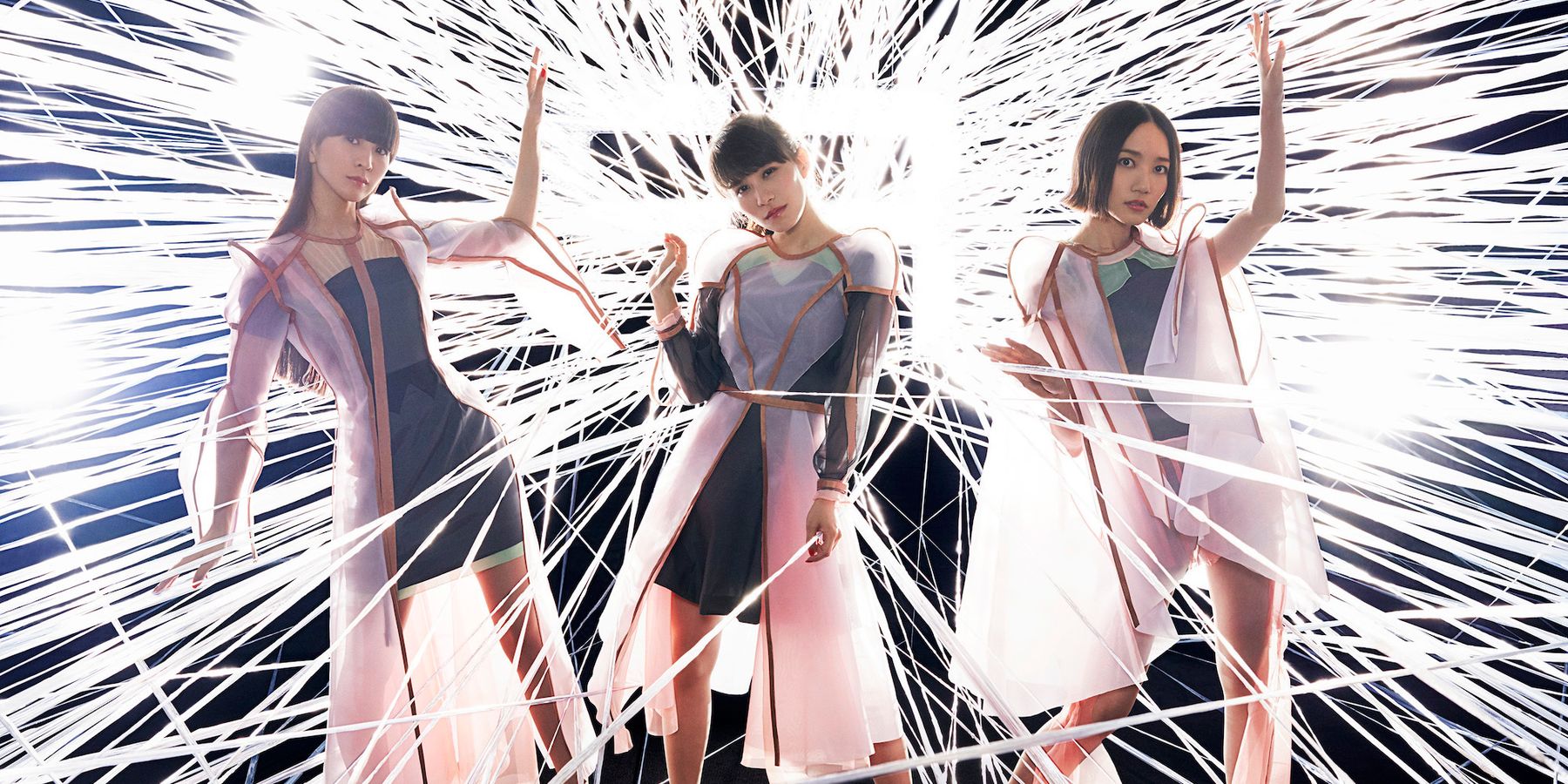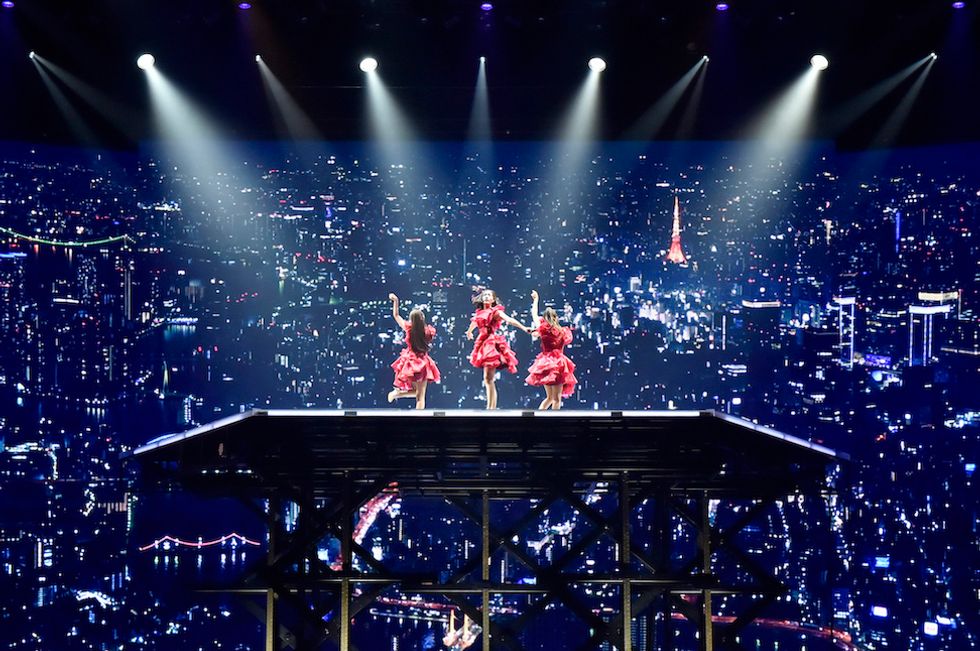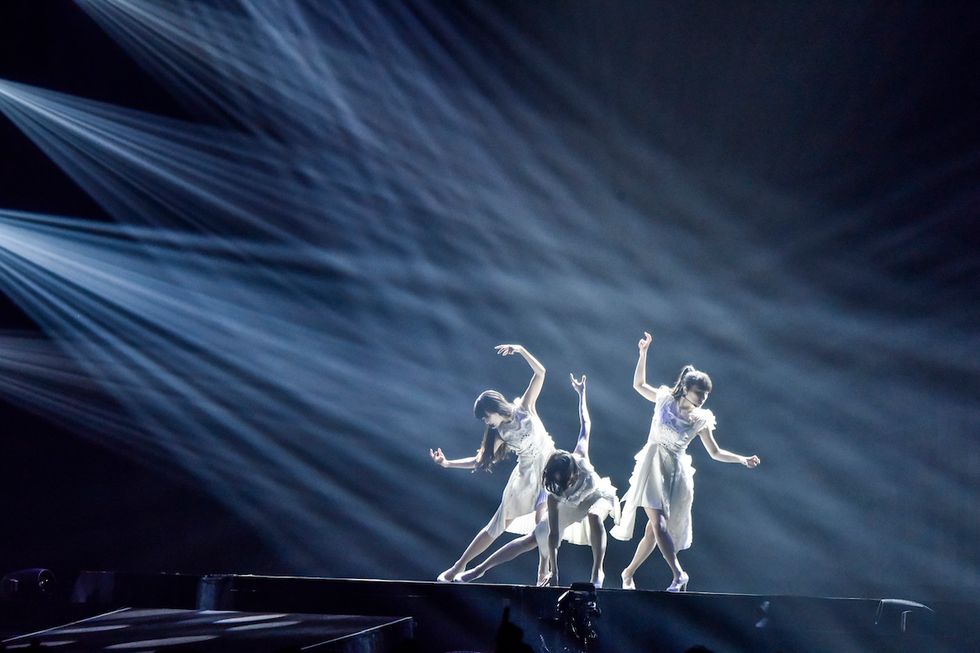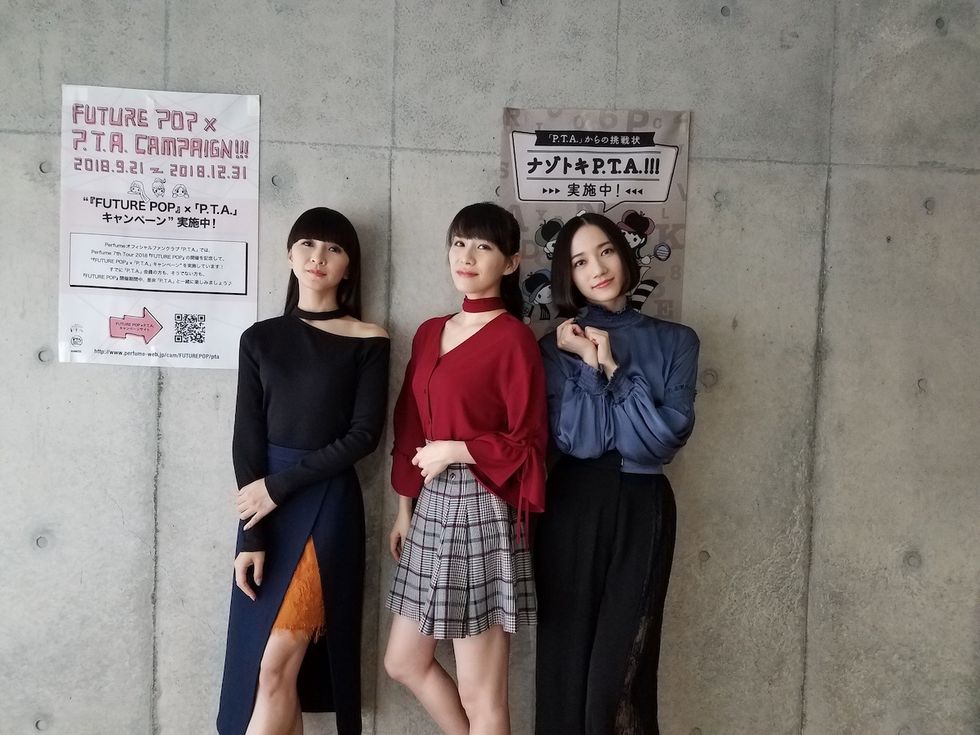
It's a warm evening in October and I'm sitting in a dark press box in an indoor sports stadium in Shizuoka, a relatively calm coastal city located about an hour and a half bullet train ride south of central Tokyo. On the floor and in the packed stands below me, fashionable young women in their twenties and 40-something salarymen wearing crisp suits and band merch are seated with their smartphones dutifully put away — a concert custom here — as they hold up paper fans and handmade posters in their place. Like myself, the crowd is patiently awaiting the onstage arrival of one of the biggest music acts in Japan. Every so often, a disembodied voice cries out from a corner of the venue: "Nocchi!" a woman shouts, while a man yells back to her, "A~chan!" "Kashiyuka!" another voice rings out. It's an electrifying pre-concert call-and-response as fans shout out the individual names of the women we're here to see: Perfume.
Within a few minutes, the venue goes dark and laser lights begin to zip frantically across the stadium like neon shooting stars. The music kicks on through the speakers — a futuristic monster of a beat that sounds like an alien spacecraft is about to land on top of the building — and a large projection image of the outlines of the trio dancing appears on the hulking LED screen behind the stage. A panel shifts opens on the stage floor and one by one, A~chan, 29, Nocchi, 30, and Kashiyuka, 30, ascend from below the arena, posed like androids atop a tall structure comprised of metal platforms. Over the next two hours or so, Perfume work their way through a pulsating set of exhilarating EDM bangers and twinkling dance-pop singles, their display of innovative visual performance effects blowing my mind in the process: Dancing holograms and image-mapping! Synchronized shadow projections! Choreography interacting seamlessly with the screen behind them! Did I mention the lasers? I'm mesmerized. This really is the future of pop.
On March 30, the group will perform a world away from Shizuoka — specifically, 6,812 miles away, at Hammerstein Ballroom in Midtown Manhattan. After kicking off their upcoming world tour in New York City, the trio will hit five other U.S. cities in the spring (Chicago, Dallas, Seattle, San Jose and Los Angeles) before distinguishing themselves as the first female J-pop group to perform at the Coachella Music & Arts Festival in Indio, California. Their highly anticipated festival set will mark a turning point for J-pop in the West, as well as an international career high for a group already celebrated as phenomenons in the Eastern music market. It will be a major moment for Perfume, but also more largely, for Asian visibility in the U.S. music industry: The group's performance comes during the same year that BLACKPINK, one of Korea's fastest rising acts, will also take the stage as the festival's first K-pop girl group to grace the lineup.

Perfume's sparkling brand of "future pop" — which is, coincidentally, the name of their latest album, released last August — is certainly forward-looking on the surface, but at its core, it pulses with the heartbeat of a group of former underdogs who make up a fierce sisterhood with a past arguably as triumphant as their future. In 2002, Ayaka Nishiwaki (A~chan), Yuka Kashino (Kashiyuka) and Ayano Omoto (Nocchi) made their debut as Perfume with a cutesy, polka-driven independent single called "Omajinai Perori" ("Good Luck Charm"). The following year the group, who formed while attending a talent academy in Hiroshima in the early 2000s, moved to Tokyo where they met Yasutaka Nakata, the prolific Japanese music producer known for his work in renowned Japanese electronic band Capsule. Over the next few years, they pursued a post-Shibuya-kei sound — the microgenre of kitsch, retro-influenced pop popularized in the Shibuya area of Tokyo in the late '90s — on bouncy bitpop-inspired singles like "Sweet Donuts" and "Monochrome Effect," gaining cred with the indie crowd but failing to make a commercial impact with a string of sonically inconsistent releases. By 2008, after struggling for a few years to make a blip outside of the indie scene, their style had evolved into something more sophisticated, electronic and undeniably futuristic. With Yasutaka at the helm, they had discovered the sound and style which would become their signature — and lead to their commercial breakout.
That very same year, the group released their seventh single, "Polyrhythm," a shimmering synth-pop banger that, thanks to its use as a theme song in a campaign on Japan's leading broadcasting corporation, NHK, unequivocally put the girls on the J-pop map. The song hit the Top 10 on the Oricon charts in Japan (similar to the Billboard charts in the U.S.), and months later their debut studio record, Game, earned the group their first No. 1 album. Five chart-topping records, numerous world tours, three fashion collections and one OK Go music video cameo later (yes, really), there's so much more to the trio than shiny, melodic techno-pop and a predilection for spacey Auto-Tune and vocoders.
Over the past 10 years, Perfume have become renowned around the world for their glossy visuals and high-tech effects (produced exclusively by Japanese visual art and media collective Rhizomatiks), their sharp sartorial style, and their impressive dance choreography (courtesy of longtime collaborator Mikiko). In their native Japan today, they are modern superstars, their faces plastered on the sides of buildings in trendy Harajuku, their music spilling out of department stores in luxurious Roppongi. Their success is also, perhaps most importantly, largely due to their personality-driven individualism, which helps set them apart from Japanese idol groups with rotational members.

Truly, there's a Perfume for everyone: There's bright, funny A~chan, an unofficial leader for the group with a trademark ponytail to match her playful personality; sweet, elegant Kashiyuka, with her long pin-straight hair and love of traditional Japanese crafts; and calm, edgy Nocchi, the effortless cool girl with a bob so famous you can walk into any hair salon in Tokyo and simply ask for the "Nocchi" by name. When I meet with the trio in their dressing room following their sold-out concert, I'm taken aback by how energetic they are. After all, they've been dancing pristinely nonstop for hours — in heels. Consider me awed when I find out that much of the choreography I just witnessed was learned only recently.
"When we first began to incorporate future bass music [like Future Pop], we didn't know how to get the tempo right. Even when Mikiko choreographed the songs, we still couldn't get it just right. It was a different rhythm that we'd never danced to before," A~chan admits through our translator, Aya. Kashiyuka chips in: "I was really looking forward to the choreo for the Future Pop tour. After we got the music, I tried to imagine what kind of choreo Mikiko was going to come up with."
When I note how much the "If You Wanna" singers seem to complement each other onstage — creating a sort of perfect "FUSION," as one of their new songs is called — Kashiyuka seems surprised. "Now that you mention it, I think that's very interesting because you know how our dances sync so well? Since our school days, the more that we try to sing together, the more our individual personalities seem to come out," she says.
Like any good perfume, which depends on the chemistry between diverse yet harmonious components, the J-pop group is truly greater than the fragrant sum of its parts. If Nocchi, Kashiyuka and A~chan comprise the top notes, and their behind-the-scenes staff and management make up the bottom notes, then producer Nakata acts as Perfume's middle notes, binding the project together with his tech-savvy beats and more than two decades of widely acclaimed production genius.
"We basically try to bring out what Nakata wants us to," Nocchi explains of their process of working with the beatsmith. "The very basic demo that we get at the beginning [of making any album] is very, very simple. After we sing over the track, he completes the song around it. To him, I think our voices are sort of a musical component to the audio he ultimately puts together; it's just one part of it, one element of the final song. We try to keep a good distance between him and us because really, we're his fans. That distance keeps the music very fresh."
It's this flawless finished product — the whole package, from the hyper-collaborative songs to the artwork to the performances and promos — that makes Perfume so compelling, both in Japan and abroad. When the girls travel to the West for international tour dates, they experience this excitement in person, particularly from their enthusiastic, more forward American fans. "Overseas fans express themselves so loudly," A~chan shares. "In Japan, politeness is sort of a team effort. They try to look around and see if friends are enjoying, just being polite to everybody. But overseas fans show their love directly to the stage. And they're really honest. If they don't know the song, they don't know the song. And if they do, they sing along."

Technology, of course, plays an integral role in the Japanese pop group's enduring global mystique. From drones to artificial intelligence, Perfume have dabbled in some of tech's most advanced corners to deliver unforgettable, performance-enhancing audio-visual effects. In November, the trio debuted a mind-bending live performance of their aggressive stomper, "FUSION." Teaming up with cutting edge telecommunications corporation Docomo, their FUTURE-EXPERIMENT VOL. 01 performance saw the three women simultaneously dancing in three different cities around the world — A~chan in Tokyo, Nocchi in New York City and Kashiyuka in London — at the exact same time, their performance spliced seamlessly in a cyber-tech livestream spectacle.
For the three performers, technology is personal and deeply embedded into their everyday lives, even offstage. "We can't live without our phones," Kashiyuka tells me, laughing. "I'm on mine from the minute I wake up to the minute I fall asleep. There's a new app that tells you how long you've been using your mobile phone ... In the last week, I've been on social media for about 24 hours and I've spent 22 hours playing game apps." (She cites Yo-kai Watch Land, an AR app game based on the anime of the same name, as her current obsession.)
While some look wearily towards the future in fear of a potential technological dystopia, Perfume are decidedly more hopeful, imagining instead the utopia visualized in their glossy music video for "Future Pop" — think AR nightclubs, self-building clean cities, virtual reality shopping, automated Jetsons-esque home appliances and convenient self-driving vehicles. On Future Pop, the trio cheerfully celebrate their futuristic ideals and unabashed optimism on shimmering standouts like "Tokyo Girl" and "Mugen Mirai." But what precisely does the future look like for Perfume? As it turns out, their vision of tomorrow is much more human than tech.
"Through email, Skype and on social media, everybody can communicate without actually meeting each other or seeing each other eye to eye. But I think it's important to sometimes be in the same place like this together, communicating directly. Like, you came all the way to Shizuoka to meet us today! I think that's beautiful," Nocchi shares.
"In a world where everything is so convenient, the future that I used to picture is all becoming a reality. But even then, anything organic or human will become more and more special in the future because of that," Kashiyuka adds. "For example, even our high-tech production has been programmed by humans. I love the non-tech part of the show and the staff behind it. There were like, 200 or 300 staff members involved in the show today."
"I think that if everybody could speak up and be confident in their personality but still care for each other, that would be an ideal world for me," A~chan says with a smile, nodding. "Ageless and genderless, no labels — that's the kind of world I want."
As Perfume near two decades of churning out some of Japan's most exciting, unexpected and sleek musical and visual output, one thing remains true: the future remains firmly in A~chan, Nocchi and Kashiyuka's synchronized hands.
Photos courtesy of Perfume/Azusa Takada
From Your Site Articles